‘Waging Winning Campaigns’ Course Teaches Students Skills as Activists and Organizers
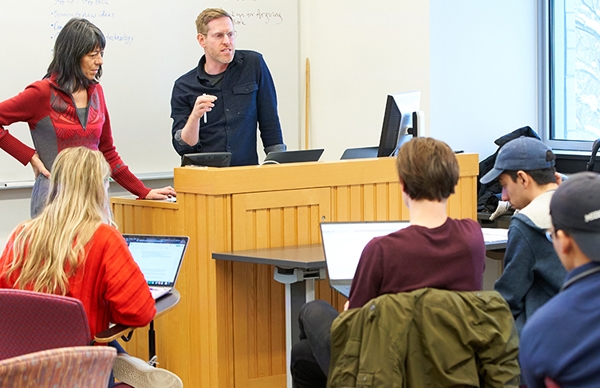
MIDDLEBURY, Vt. – Fifteen years ago a J-term class lit a spark that ignited a global movement.
A group of students in Professor Jon Isham’s 2005 class Building the New Climate Movement started what became known as the Sunday Night Group. As graduation approached, seven Sunday Night friends brainstormed how to best mobilize a social movement around climate change.
They planned to move together to Montana to battle against new coal plant construction (while skiing and drinking microbrews on the side), but instead rallied with mentor Bill McKibben to hold a climate march from Ripton to Burlington, Vermont. The march led to the 2007 Step It Up campaign, which in turn led to the founding of 350.org—now an international organization that has mobilized millions of people around the globe.
“It wasn’t like we decided we wanted to be professional activists,” said 350.org cofounder Phil Aroneanu ’06.5. “We were simply committed to the issue and working on it.”
Aroneanu stayed with 350.org for its first eight years, serving as U.S. campaigns director, managing director, and political engagement director. After that, he directed Bernie Sanders’s 2016 New York state presidential campaign and worked as an independent campaign strategist and organizer, and now he directs digital organizing strategy for the American Civil Liberties Union.
In January, Aroneanu was back on campus launching a new generation of activists with the J-term class Waging Winning Campaigns, which he cotaught with Deborah Moore, western states senior campaign manager for the Union of Concerned Scientists.
“I wanted to give students a window into what it looks like on the ground, what it feels like, and how to navigate politics—and maybe give them a leg up as they enter into the world and a life of civic engagement.”
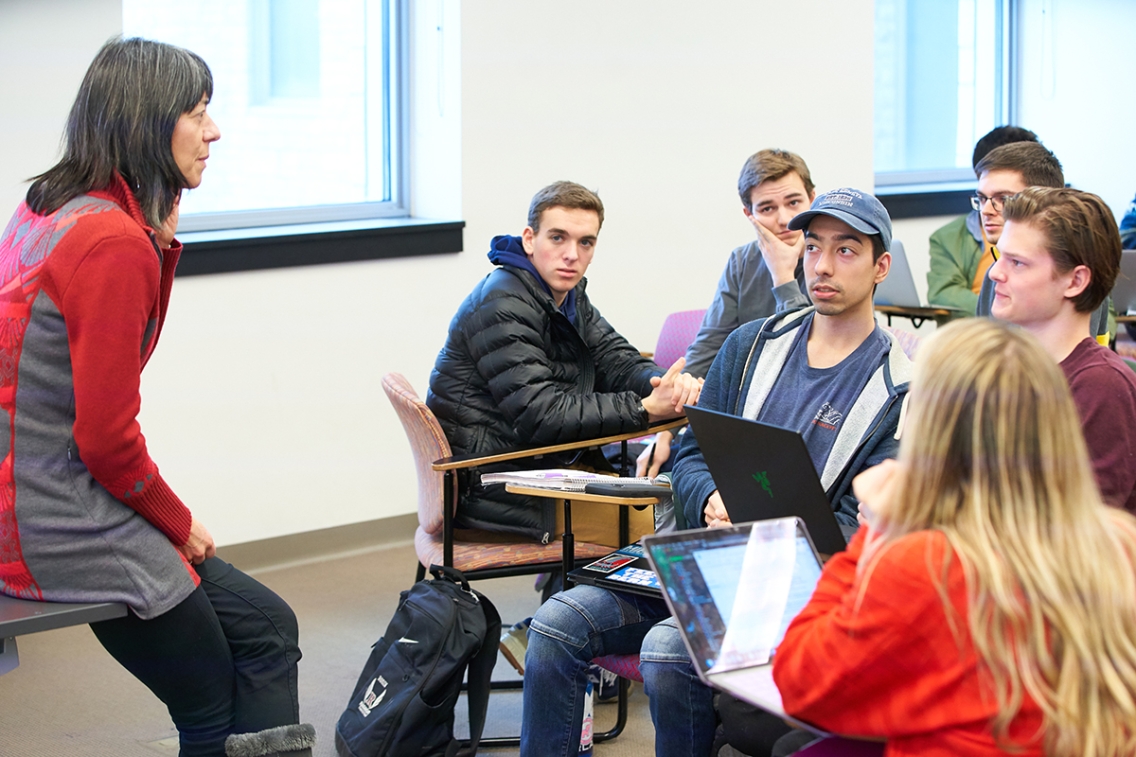
J-term instructor Deborah Moore coaches students on their campaign presentation. Photo: Todd Balfour
Campaigns, explained Aroneanu, “are about channeling passion and emotion and energy into meaningful outcomes. Not just expressing yourself for the sake of expressing yourself, but expressing yourself in a way that actually gets something done. With these tools, you can put yourself in a mindset where you take a step back and you say, ‘I’m really angry about this thing, but I’m going to think systematically about who I’m angry at, for what? How can I change their mind? And who do I need to come along with me to do that?’ It’s really basic when you come down to it.”
Asked what he’s enjoyed most about being on the other side of the classroom, Aroneanu said, “The students have been really incredible. Many of them are first-years, and they’ve come to this with a sense of wonder and excitement, and this idea that there’s so much to discover. That’s really different than the hard-nosed political world that I spend most of my days in. It’s refreshing to be here and get reenergized by their energy.”
Moore, Aroneanu’s coteacher and a Reed College graduate, was instrumental in helping pass California’s 2018 law mandating 100 percent clean electricity by 2045. In over three decades of organizing, she’s run everything from a green schools initiative to the 1,000 Flowers campaign to register women to vote at beauty parlors and nail salons.
A physics major as an undergraduate, Moore worked in a lab her first year out of college and saw herself on a PhD track in biophysics. Then one day, she said, “I realized that all my questions about my research were not, ‘What experiment do I need to do next to understand how this protein works?’ My questions were, ‘Well, if I figure this out, am I going to help feed the world? Am I going to create alternative energy?’ I realized that I was more interested in applied science.”
She soon landed a job as a scientist with the Environmental Defense Fund.
Senior Laura Friedrich, a religion and computer science major, was looking for a J-term class where she could learn from practitioners in a hands-on way.
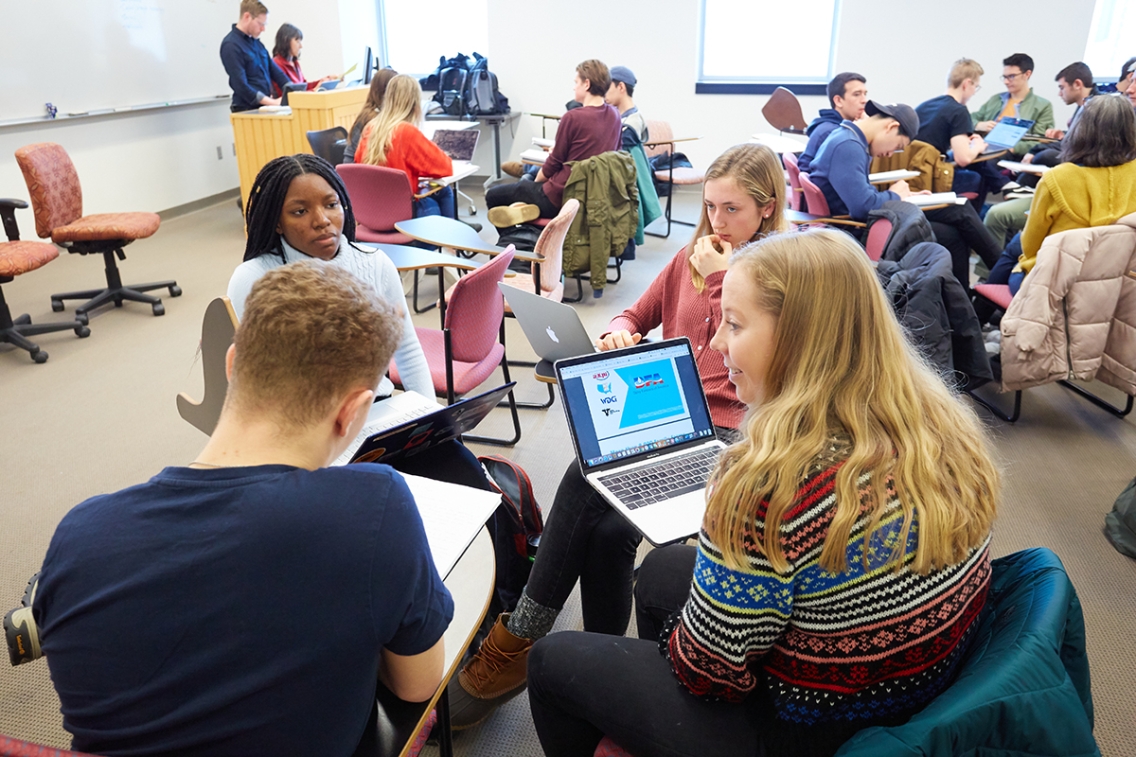
In small groups, students developed individual campaigns on topics of particular interest to them. Photo: Todd Balfour
“I wanted to take a class with guest lecturers and get exposure to real-world issues, how people tackle them, the attitudes they bring to problem solving,” said Freidrich. “I also liked that the class was cause based—having this cause that you’re passionate about and saying, ‘How can I influence the decision makers? How can I influence a culture shift? What are the little things that I can do? What are the bigger things that I can do?’”
Early in the class, students were sorted into affinity groups around broader issues like human rights, the environment, and militarism, and then worked in that small group to design a campaign with a specific goal.
Friedrich’s group honed in on gun control.
“Our campaign’s called ‘Wait Three Days to Save a Life,’ and it’s centered on instituting a waiting period for purchase of firearms in Vermont, but hopefully nationwide, in order to reduce the number of injuries and deaths resulting from firearms, especially in cases of suicide and domestic violence,” Friedrich said.
For Friedrich the issue is both political and personal. She survived a shooting in her high school, huddling in a corner with other students in her math class for what “felt like days.” Then two years later, a neighbor shot and injured his wife and then shot and killed a neighbor who tried to intervene and injured another. Over the past seven years there have been nine suicides in her school district, she said. Friedrich comes from Centennial, Colorado, where mass shootings are all too familiar: Columbine High School and the movie theater in Aurora are both a short drive away. Last May, two students opened fire in a nearby charter school.
The class, said Friedrich, has helped her move from a lingering sense of hopelessness and powerlessness around issues of gun violence to a clear sense of agency.
“The trauma is still there, that’s never going to disappear, but now I feel like I understand different mechanisms to produce change,” she said. “That was why I wanted to take this class.”
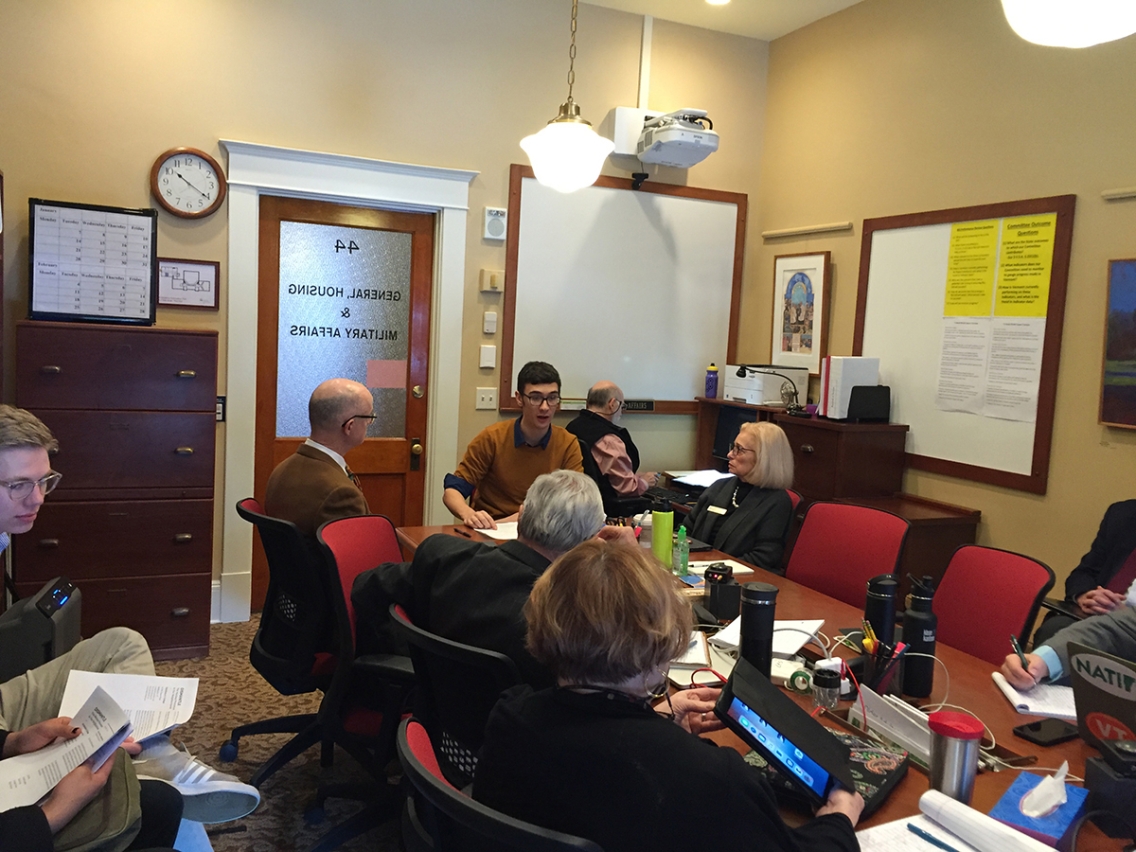
A student in the J-term course Waging Winning Campaigns speaks with legislators and staff members at the Vermont State House as part of a class trip. Photo: Deborah Moore
Other students focused their campaigns on topics such as eliminating plastic water bottles on campus; getting Hannaford supermarkets to sign on to Migrant Justice’s Milk with Dignity agreement; opposing the planned 20-plane fleet of nuclear-adaptable/nuclear-capable F-35s in Burlington (five are already stationed there); and passage of the Global Warming Solutions Act (H.688), which would turn Vermont’s current climate goals into requirements.
Senior Tarik Shahzad, who’s majoring in environmental studies, said after he returned home last summer from the Middlebury School of the Environment in China he found himself deeply questioning how to connect his values to his actions.
“I realized I’d been a passive ally for a lot of progressive issues, and I’ve posted on social media and I’ve talked to friends, but as the urgency of the moment comes closer and closer I needed to become more active. So last fall I started organizing for Bernie, and then I joined this class.”
Shahzad especially enjoyed the class “Advocacy Day” at the Vermont legislature in Montpelier. Students met one-on-one with key legislators on their issues, observed committee meetings, and engaged with legislators more informally over lunch and in the hallways. One student testified at a committee hearing. In the weeks prior, they had prepared for even the most chance encounter, practicing short presentations, clarifying their “ask,” creating fact sheets to leave in legislators’ hands, drilling down on details.
For Shahzad, not only did the day in Montpelier help demystify the legislative process, it profoundly reversed some of his assumptions.
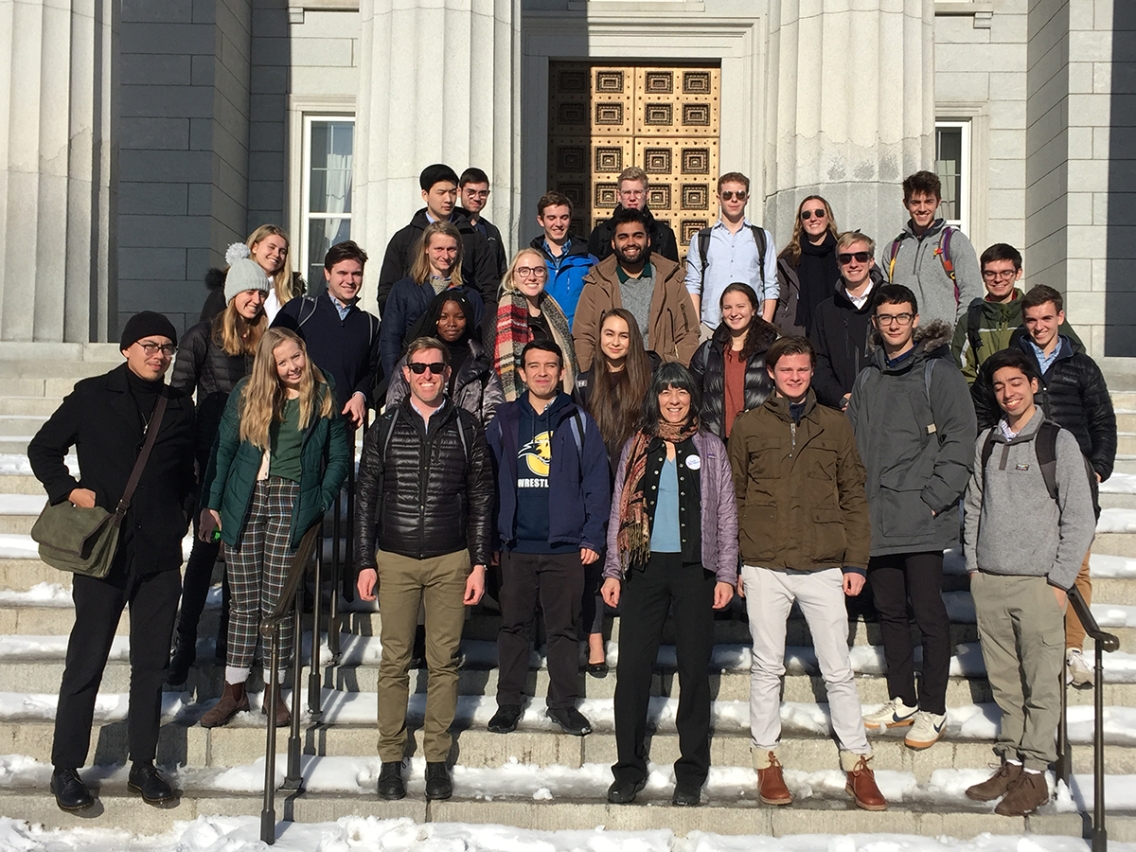
Students and instructors for the J-term course Waging Winning Campaigns gathered on the steps of the Vermont State House during their trip to Montpelier to meet with legislators. Photo: Deborah Moore
“I had always viewed people who were elected into office as ‘99.9 percent corrupt 99.9 percent of the time’ and as people who ‘do not listen to the average person.’ But when you speak, especially with Vermont representatives—politicians who aren’t politicians year-round, who are really in touch with their constituents and who related to us on such a personal level—I think they were humanized to me.
“Before the class, I was more cynical when it came to change,” Shahzad continued. “But the class has shown me that as long as you are persistent and have perseverance—that’s something that both Deborah and Phil taught us—you can make change. Fighting for access is one of the most important things a regular citizen can do. When you fight for access and for being included in the conversation, that’s when your voice is heard.”
—Gaen Murphree

